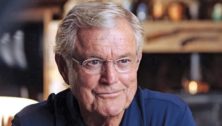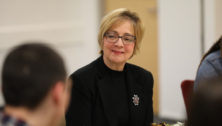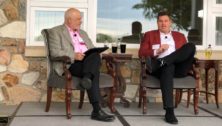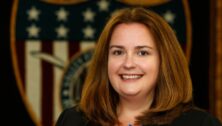Delaware County Leadership: Daylin Leach, Former State Senator, and Representative
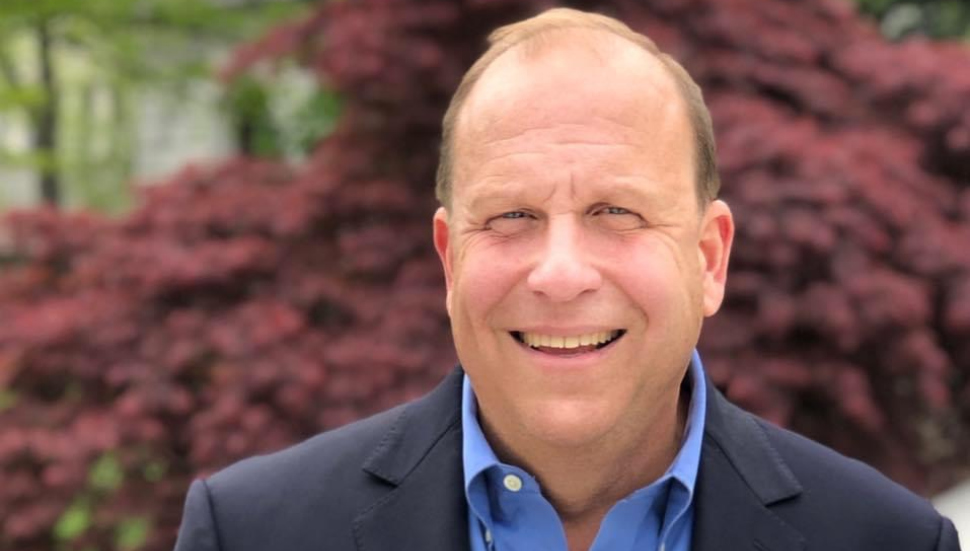
Daylin Leach, former State Senator, and Representative, spoke to DELCO Today about the lessons he learned from his tumultuous childhood – he went to eight different elementary schools – and how he became interested in politics and law early on.
Daylin described how another former Senator and Representative, Connie Williams, helped him enter the world of politics when he filled her former seats in the House and the Senate. He talked about why passing Pennsylvania’s medical marijuana legislation was so important to him and why he’s now working in the cannabis field as a consultant, business owner, and speaker.
Where were you born, and where did you grow up?
I was born an only child in Philadelphia in 1961 and grew up in a variety of Philadelphia neighborhoods. My mother was a single mother, and I never met my father. My mother moved a lot, so I was constantly in a different place. For example, I went to eight elementary schools – and no, I was not expelled from the first seven!
What did your mother do for a living?
I never understood how this happened, but my mother was an extremely gifted artist. There’s not a long history of artistic talent in my family. I certainly have no artistic talent. But for some reason, my mother was just a gifted artist. She studied at the Barnes and went to the Philadelphia College of Art. She had a career as a fine artist, a commercial artist, and a teacher of commercial art, which is how she made a living.
Are you an only child?
I was my mother’s only child. My father, whom I never met but later learned a lot about over the years, mainly through ancestry.com, enjoyed very short-term relationships, resulting in children he did not wish to pay child support for. So he would change his name every couple of years – not legally, just what he called himself. He had nine kids in total, so I have eight half-brothers and sisters I’ve never met.
What memories do you have of growing up and attending eight different elementary schools?
I went to so many elementary schools because while my mother was a gifted artist, she was not necessarily a gifted parent. She couldn’t handle things for a while and put me in a series of foster homes.
So I would literally be in a classroom one day, and someone would come in and call me to the front. They would say, “Daylin, you’re going to a different school tomorrow and living in a different house tomorrow.”
But what’s interesting about being a kid is that I had no frame of reference when things happened. It’s like, this is how life is, so I just accepted it.
I remember that there were a lot of adjustments, and obviously, there were some painful parts. Still, I think on the good side, it made me very gregarious and outgoing because I had to go in and make friends quickly. It also gave me a lot of poise and ability to handle difficult situations because some of the foster homes were quite unpleasant, quite Dickensian. It gave me a resilience that I think helped me later in life.
Did you try sports? Did sports help you at all?
I became infatuated with both tennis and chess in sixth grade. With tennis and chess, what attracted me was that unlike team sports, you get all the credit and all the blame. Both have been a part of my life since then.
What jobs did you have any jobs growing up?
When I was 16, I got my first few jobs, which were awful. I quickly learned that agricultural work was not for me. My first job was at a place called Seams Seed Farm, and my job was to detassel corn plants. I would go into the fields, and it was like 98 degrees. My muscles hurt from my arms being up in the air all day, and then I would pull the tassels off, and the dust gets all over me, so I’m itchy, sweaty, and miserable.
After that, I got a summer job I loved at Dorney Park for a couple of summers. I really enjoyed that. And I ended up teaching tennis at summer camps when I turned 18. That was a dream job for me.
You came out of your tumultuous childhood full of determination and more than a little charisma.
Obviously, some of these things are genetic, and there’s a whole debate, nature vs. nurture. But I feel like I could have come out really embittered. I got a few breaks that helped along the way, and things may have gone in a different direction if I didn’t get those breaks. There were a few adults who made a positive difference.
Did you want to go to college?
I knew I wanted to be a lawyer from a very young age. Law and politics were always interesting to me. I stayed up all night in 1968, when I was 7 years old, watching the Nixon/Humphrey election returns. I was obsessed with politics, policy, and law from a young age.
Where does that obsession come from?
I’m not really sure. One thing I remember – one of the not entirely pleasant foster homes I lived in, they would send me out at like 8:00 in the morning on a day that I wasn’t going to school. They’d say, “Come back at 9:00 at night. We don’t really want to see you until then.”
One day it was cold, so I was in northeast Philadelphia and just wandering the streets. I saw the Bushrod Public Library on Castor Avenue. I just wanted to be warm, so I wandered in. But I started looking around and found a book on the Kennedy assassination. I remember going back deliberately the next day to find more kids books on American history that I could handle. And I just gravitated to politics from there.
Where did you end up going to college?
I went to Temple University. I wanted to attend a state school because I thought I could afford that. I didn’t realize Temple, at the time, was the most expensive state school in the country.
Looking back, was Temple a good choice for you?
No! I liked being in the city, but it was a commuter and jockish school at the time. I would have been much happier at a small liberal arts college like Swarthmore.
Why did you go to Texas for law school?
One night I was watching the movie “Urban Cowboy.” I was like, I’ve been in Philadelphia my whole life. I want to try something different. Texas looks cool. I applied to law school at the University of Houston and was accepted.
What an adjustment for a kid from Philly to make.
Total culture shock! I thought it was important to branch out a little bit. I could have gone to Temple for law school too, and it’s a good law school, but I would have been living in the same three-block area of Broad Street for my entire college experience.
Was Houston a good choice for you?
Yeah, Houston was okay. I didn’t wind up staying in Houston. I always tell kids, “Go wherever you want for undergrad, but if you go to law school, you should go where you want to practice.” Because when I got out of Houston, I knew a lot of Texas law and attorneys who were practicing in Houston. Not so much up here.
So you came back to Philly afterward?
I knew I wanted to come back to the Northeast. I liked the Northeast and had a job lined up in Pennsylvania.
Looking back over your career, who were the people who saw promise in you?
In terms of my political career, it was interesting because I didn’t just decide to run for the House. There was an incumbent representative, Connie Williams, and she ran for the state Senate. She was not expected to win, because it was a Republican seat, but she unexpectedly did win. When that happens, there’s not a primary to replace her; the party just picks someone to run in a special election.
I thought there was no chance they would pick me because I had just moved to the district a few months earlier. But I applied, and I’m always grateful – a couple of people were impressed with my interview and fought for me and were able to prevail. Connie was one of them, and there was a woman named Nora Winkelman, the chair of the Lower Merion Dems at the time and a real force of nature.
What do you think the committee saw in you?
I think they saw that I really understood and was committed to the issues. Many people run for office and don’t know anything about issues. They just want to be something. I wanted to do something. I had studied this stuff for decades and read everything, so I understood the issues. I had a clear vision of where I wanted to go, and I think that was not entirely common when they interviewed people.
Further in your career, who gave you the confidence to go for State Senate?
Connie eventually called me and said, “I’m not running for reelection,” which surprised me because she’s young and spry. But I think she just got tired of going to Harrisburg. Harrisburg is a grueling place and a grind because when you’re not there, you have three events in your district every night. I think Connie felt like, “Well, I’ve done this long enough.” She said if I was interested in being in the Senate, she would support me.
There are advantages and disadvantages, frankly, to being in the Senate. You only run every four years instead of every two, but it doesn’t matter that much if you have a relatively safe district. And you get to vote on certain things like confirmation of judges, which I was interested in.
People ask me which is better, and I always say that being in the Senate is better at home because you’re considered more important than you are. You’re invited to speak more. If you write an editorial, it’s more likely to be published.
But I think being in the House is a lot better in Harrisburg. There’s more camaraderie – in the Senate, there’s almost none.
What are your current priorities, Daylin?
Well, as you know, it was my bill that passed as the medical marijuana bill in Pennsylvania. I was always for it, but it wasn’t a top priority because I didn’t think there was much chance of it passing. But then I had a discussion with a woman whose son had Dravet syndrome, a horrible seizure disorder. Some cannabis-based products had helped kids in other states, and I was so angry that she couldn’t get it. It became my passion for two and a half years until we got it passed, against all odds.
And then, because of my involvement, I became passionate about the issue for many reasons: criminal justice reform and racial justice.
So now, I’ve been involved in cannabis in various contexts. Consulting – I’m trying to get the cannabis industry to be more potent politically because cannabis is really inept politically, as an industry, for a variety of reasons.
I’m starting a new company that’s cannabis-related. I speak at a lot of conferences on it – I’m going to one this weekend in New Jersey. It’s given me a life that’s fun and interesting.
At this stage, I’m a big fan of mixing it up and doing different things with your life. I practiced law for 17 years. I was in the legislature for 18 years. Now, I’m going to do this for a few years. I get burned out and stale if I don’t keep it fresh.
So what do you do with your free time, Daylin?
These days, I try to exercise a lot because exercise, I think, is the key to staying youthful and vigorous. I was going to say, “I really enjoy it,” but I really enjoy it after my workout is finished. I feel good when it’s over – maybe not so much while it’s happening. But I run, I lift weights, I play tennis.
I write on medium.com. I have many followers and write about political issues or music or whatever, often with a humorous bent. That all keeps me pretty busy. I travel a lot.
Do you read much?
Yeah, I read a lot. I read a lot of biographies and periodicals, like foreign policy periodicals, some cannabis things, and political analysis. I try to keep sharp on what’s going on in the world.
Do you have a favorite biographer?
I always like David McCullough. And my favorite author is Joseph Heller because I love comedy and seriousness, light and shade together.
In this crazy world, Daylin, what gives you hope?
It’s hard because the world is really difficult right now in a lot of ways. The one thing I think you have to cling to is that it’s been hard before, and somehow we climbed out of it. The way we’ll climb out of it is through leadership that transcends the moment.
When things look bad, it doesn’t mean events ending badly is inevitable. It just means we haven’t found a way out yet.
We’ve been very lucky in America – during the Civil War, we had Lincoln. I don’t know if we had Rutherford B. Hayes during the Civil War, it could have gone a totally different direction. World War II and the Great Depression, we had Roosevelt.
So transcendent leadership is what we need, and it has a habit of coming along when we need it most. I hope that this historical cycle – the historical El Nino if you will – will come around again.
Finally, Daylin, what was the best piece of advice you ever got?
It wasn’t so much an aphorism. It was a college professor – I forget the guy’s name – who talked to me about chaos theory. If you know chaos theory, there’s a lot to it. Still, one of the things that most resonated with me is the theory of the butterfly wings, which essentially says very small actions can have enormous consequences down the line. You don’t know what they are.
I walked into dinner one time to drop off something with some friends who were having dinner that night, and it just so happened that I met my wife that night.
I could tell a million stories like that – good and bad. Any moment can be that pregnant moment, a fulcrum that changes everything going forward. You just don’t know which moments are the critical ones. That’s what makes every moment exciting. My advice to other people would be to remember that every moment can be life-changing and treat it that way.
Join Our Community
Never miss a Delaware County story!
"*" indicates required fields





![95000-1023_ACJ_BannerAd[1]](https://delco.today/wp-content/uploads/sites/3/2023/03/95000-1023_ACJ_BannerAd1.jpg)





















